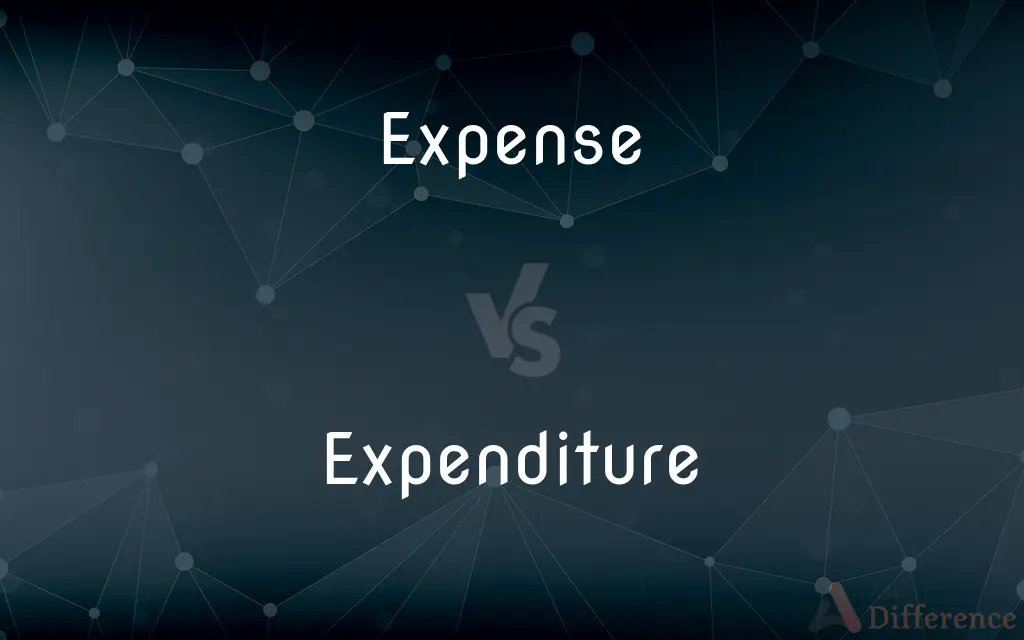Expense vs. Expenditure — What's the Difference?
By Tayyaba Rehman & Urooj Arif — Updated on March 20, 2024
Expense refers to the outflow of money towards goods or services that are consumed within a short period, typically affecting a company's income statement. Expenditure, is the spending of money on goods or services for either immediate consumption.

Difference Between Expense and Expenditure
Table of Contents
ADVERTISEMENT
Key Differences
An expense is a cost used up in the earning of revenues, typically within a specific accounting period, such as salaries, rent, and utilities. These are operational costs necessary for the day-to-day functioning of a business and are directly linked to the income statement, reducing the net income. On the other hand, expenditure encompasses a broader range of financial outflows, including the purchase of assets (capital expenditures), investments, and also the costs that are classified as expenses. Expenditures can affect the balance sheet by increasing assets or decreasing liabilities, in addition to impacting the income statement when they are recognized as expenses over time.
Expenses are crucial for managing and understanding the operational efficiency and profitability of a business. They are regularly incurred as part of the routine business operations and are essential for maintaining the ongoing business activities. Whereas expenditures, especially capital expenditures, are more about strategic investment in the business's future growth and expansion, enhancing the company's earning capacity over a longer period.
For accounting purposes, expenses are recognized when incurred, regardless of when the payment is made, following the matching principle that ties expenses to the revenues they help generate. Expenditures, particularly those for capital assets, are capitalized on the balance sheet and then expensed over time through depreciation or amortization, reflecting the asset's consumption or use over its useful life.
The distinction between expenses and expenditures is not just in their impact on financial statements but also in their strategic implications for the business. Expenses are about the cost of operations that keep the business running, while expenditures represent investments that secure the business's future viability and growth.
Comparison Chart
Definition
Outflow of money towards goods or services consumed within a short period.
Spending of money on goods or services, including long-term assets and investments.
ADVERTISEMENT
Impact
Affects the income statement by reducing net income.
Impacts both the income statement and balance sheet.
Purpose
Operational costs for day-to-day functioning.
Includes operational costs, asset acquisition, and investments.
Recognition
Recognized when incurred, following the matching principle.
Capitalized and then expensed over time for long-term assets; immediate recognition for operational costs.
Examples
Salaries, rent, utilities.
Buying equipment, investing in securities, paying for immediate services.
Compare with Definitions
Expense
Directly tied to the earning of revenues.
The cost of goods sold expense is directly linked to sales revenue.
Expenditure
Can be for acquiring long-term assets.
Expenditure on a new office building is capitalized on the balance sheet.
Expense
Reduces the net income on the income statement.
Utility expenses reduced the quarterly profits.
Expenditure
Includes investments beyond operational costs.
Investment in marketable securities is a financial expenditure.
Expense
Recognized when incurred, not necessarily when paid.
Advertising expenses were recognized in December, though paid in January.
Expenditure
Affects financial position and operational capabilities.
Research and development expenditure supports future product innovation.
Expense
Costs related to the core business operations.
The company's monthly rent expense for its office space.
Expenditure
Outflows of cash or other valuables for various purposes.
The capital expenditure on new machinery will improve production efficiency.
Expense
Incurred regularly for business operations.
Salaries expense is recorded every month.
Expenditure
Can be operational or capital in nature.
Operational expenditures include daily business expenses; capital expenditures involve asset purchases.
Expense
Expenditure is an outflow of money, or any form of fortune in general, to another person or group as payment for an item, service, or other category of costs. For a tenant, rent is an expense.
Expenditure
The action of spending funds
The expenditure of taxpayers' money
Expense
The cost incurred in or required for something
Conference rooms were equipped at great expense
Book into the best hotel you can find and hang the expense
Expenditure
The act or process of expending; outlay.
Expense
Offset (an item of expenditure) as an expense against taxable income
Up to $17,500 in capital expenditures can be expensed in the year they were incurred
Expenditure
An amount expended.
Expense
Something spent to attain a goal or accomplish a purpose
An expense of time and energy on the project.
Expenditure
An expense.
Expense
A loss for the sake of something gained; a sacrifice
Achieved speed at the expense of accuracy.
Expenditure
Act of expending or paying out.
Expense
An expenditure of money; a cost
An improvement that was well worth the expense.
A trip with all expenses paid.
Expenditure
The amount expended; expense; outlay.
The expenditure of time, money, and political capital on this project has been excessive.
Expense
Charges incurred by an employee in the performance of work
Was reimbursed for her travel expenses.
Expenditure
The act of expending; a laying out, as of money; disbursement.
Our expenditure purchased commerce and conquest.
Expense
(Informal) Money allotted for payment of such charges.
Expenditure
That which is expended or paid out; expense.
The receipts and expenditures of this extensive country.
Expense
Something requiring the expenditure of money
Redecorating the house will be a considerable expense.
Expenditure
Money paid out
Expense
(Archaic) The act of expending.
Expenditure
The act of spending money for goods or services
Expense
To charge with expenses.
Expenditure
The act of consuming something
Expense
To write off as an expense.
Expense
A spending or consuming, often a disbursement of funds.
She went to great expense to ensure her children would get the best education.
Buying the car was a big expense, but will be worth it in the long run.
We had a training weekend in New York, at the expense of our company.
Expense
The elimination or consumption of something, sometimes with the notion of loss or damage to the thing eliminated.
Jones reached the final at the expense of Smith, who couldn't beat him.
Expense
(obsolete) Loss.
Expense
(transitive) To charge a cost against an expense account; to bill something to the company for which one works.
It should be acceptable to expense a business lunch with a client.
Expense
A spending or consuming; disbursement; expenditure.
Husband nature's riches from expense.
Expense
That which is expended, laid out, or consumed; cost; outlay; charge; - sometimes with the notion of loss or damage to those on whom the expense falls; as, the expenses of war; an expense of time.
Courting popularity at his party's expense.
Expense
Loss.
And moan the expense of many a vanished sight.
Expense
Amounts paid for goods and services that may be currently tax deductible (as opposed to capital expenditures)
Expense
A detriment or sacrifice;
At the expense of
Expense
Money spent to perform work and usually reimbursed by an employer;
He kept a careful record of his expenses at the meeting
Common Curiosities
Can an expenditure become an expense?
Yes, expenditures for items consumed within a fiscal period are recorded as expenses, and capital expenditures are expensed over time through depreciation.
Why are expenses important for a business?
They are crucial for understanding the cost of operations and the business's profitability.
How do capital expenditures differ from regular expenditures?
Capital expenditures involve the purchase of assets with a useful life extending beyond the current accounting period, meant for the business's long-term growth.
What is the main difference between an expense and an expenditure?
The main difference lies in their usage and impact on financial statements: expenses reduce net income on the income statement, while expenditures can also affect the balance sheet.
How is the recognition of expenses and expenditures handled in accounting?
Expenses are recognized when incurred, following the matching principle, while expenditures for assets are capitalized and then depreciated.
Do all expenditures affect the company's profitability?
Directly or indirectly, yes, by either reducing current period income when treated as expenses or through depreciation affecting future periods.
What role do expenditures play in financial planning?
Expenditures, especially capital ones, are vital for strategic financial planning, focusing on long-term growth and asset enhancement.
Can a business manage without incurring expenses?
No, expenses are inherent to operating a business and are necessary for generating revenue.
How does the treatment of expenses and expenditures affect tax?
The recognition and timing of expenses and capital expenditures can significantly impact a business's taxable income and tax liabilities.
Is it possible for an expenditure not to become an expense?
Yes, if it is for acquiring non-depreciable assets or investments that do not depreciate or amortize over time.
Share Your Discovery

Previous Comparison
Tall vs. High
Next Comparison
Piscina vs. WashbasinAuthor Spotlight
Written by
Tayyaba RehmanTayyaba Rehman is a distinguished writer, currently serving as a primary contributor to askdifference.com. As a researcher in semantics and etymology, Tayyaba's passion for the complexity of languages and their distinctions has found a perfect home on the platform. Tayyaba delves into the intricacies of language, distinguishing between commonly confused words and phrases, thereby providing clarity for readers worldwide.
Co-written by
Urooj ArifUrooj is a skilled content writer at Ask Difference, known for her exceptional ability to simplify complex topics into engaging and informative content. With a passion for research and a flair for clear, concise writing, she consistently delivers articles that resonate with our diverse audience.















































